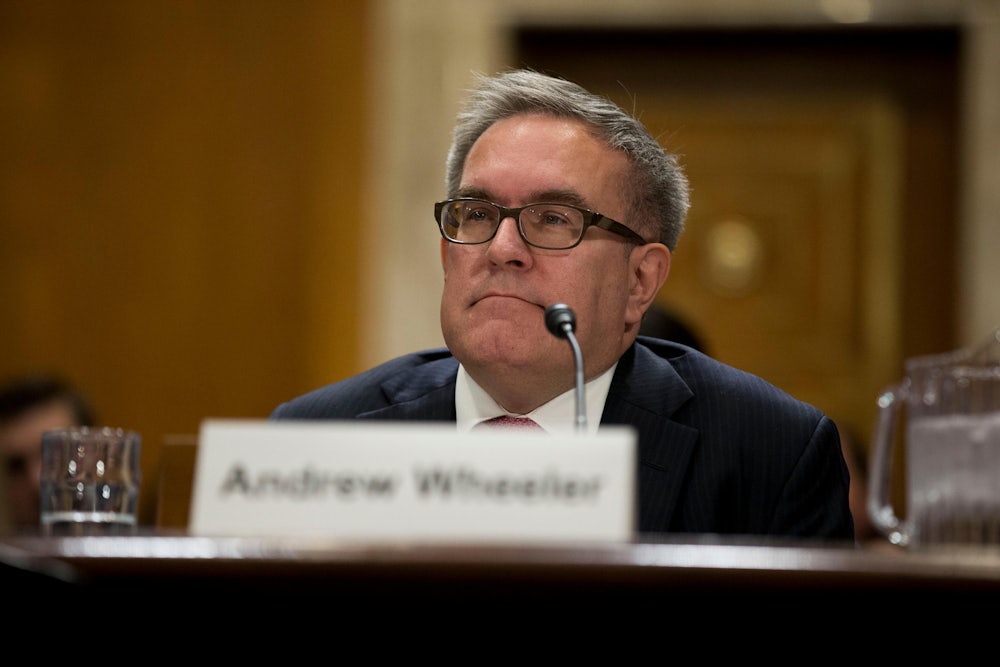Scott Pruitt is the head of the Environmental Protection Agency, for now. According to Politico, the former Oklahoma attorney general is “interested” in becoming U.S. attorney general if Jeff Sessions leaves the administration. It’s not the first time Pruitt reportedly has eyed a higher office, whether it be a governorship, a Senate seat, or even the presidency. Pruitt has denied it all, but even so, Republican presidencies have had short-lived EPA administrators. Scandal-plagued Anne Gorsuch lasted only two years as Ronald Reagan’s EPA chief. Christine Todd Whitman and Michael Leavitt each served two years under George W. Bush.
So who takes over if Pruitt leaves? The leading contender to date is Andrew Wheeler, a former coal lobbyist, EPA bureaucrat, and aide to the snowball-wielding Senator Jim Inhofe. President Donald Trump nominated Wheeler, who is currently an energy attorney, to be the EPA’s deputy administrator in October, and Wheeler faced a full Senate hearing in November. Because the Senate never voted on Wheeler’s nomination, his nomination was sent back to committee at the start of the new legislative session in January.
Wheeler’s nomination is now moving again. HuffPost’s Alex Kaufman reports that the Senate Environment and Public Works Committee will vote to advance Wheeler’s nomination on Wednesday. Soon after, Kaufman wrote, “Wheeler is likely to be confirmed in the full Senate, where the GOP holds a narrow majority.” If Wheeler is confirmed, he’d be first in line to become the acting administrator if Pruitt leaves.
Wheeler’s confirmation would be great news for the country’s largest coal mining company, which will have secured one of its longtime lobbyists in a position of power over environmental regulation. Murray Energy has seen a number of wins in the last year. Weeks after Trump’s inauguration, the New York Times’ reported, CEO Robert Murray “presented Mr. Trump with a wish list of environmental rollbacks,” and since then the majority of those 16 requests have been fulfilled. Murray personally donated $300,000 to Trump’s inauguration, and the company recently donated $1 million to Trump’s super PAC. (Wheeler de-registered himself as a Murray lobbyist on August 11, three days after the company’s donation.)
In many ways, Wheeler is similar to Pruitt. Both men are climate-change deniers who speak in a disciplined legalese, thereby avoiding political gaffes. But environmentalists should consider Wheeler a more egregious nominee. His conflicts of interests are certainly worse: Pruitt may have worked closely with the fossil fuel industry before taking office, but Wheeler worked for the fossil fuel industry. Before he took office, Pruitt indirectly raised money from conservative dark money groups to stop the EPA regulations he’s now in charge of. But Wheeler directly raised money for the same Republican Senators who are evaluating his nomination, the Intercept reported on Wednesday.
When Pruitt worked with polluters, he did so to advance his own political career; when Wheeler did it, he helped advance the career of Inhofe, the Senate’s most outspoken denier. Wheeler also publicly defended alt-right hero Milo Yiannopolous, who was banned from Twitter after he directed his Twitter followers to hurl racist abuse at comedian Leslie Jones.
The Truth About Milo #milo https://t.co/cbWplbuLWy
— Andrew Wheeler (@AndrewRWheeler) August 16, 2016
Pruitt hasn’t decided whether to challenge the endangerment finding, the EPA document that deems carbon dioxide a pollutant that should be regulated under the Clean Air Act. On Tuesday, Kaufman reported that Wheeler “could be the man to lead that assault,” because the document was based on a scientific report from the U.N. Intergovernmental Panel on Climate Change:
In March 2010, [Wheeler] accused the IPCC of blurring “the lines between science and advocacy” and functioning “more as a political body than a scientific body.” He suggested the EPA could “reconsider its endangerment finding without almost exclusively relying upon the IPCC,” according to remarks posted to his website.
And yet, considering how Senate Democrats challenged Pruitt during his confirmation hearing, there hasn’t yet been much public outcry from Senate Democrats about Wheeler. His confirmation hearing in November was an opportunity for Democrats to raise hell, and to be fair, Senator Sheldon Whitehouse was prepared with intense questioning about Wheeler’s ties to Murray Energy. But as The Washington Post pointed out, Democrats as a whole “trained most of their critical fire” on Kathleen Hartnett-White, Trump’s nominee to lead the White House Council on Environmental Quality. They was effective: Last week, Trump withdrew Hartnett-White’s nomination. But Wheeler’s nomination remains, and as Kaufman noted on Tuesday, “Democrats seem more at ease” with it. “No Democrat raised concerns about Wheeler last week during Pruitt’s first Senate hearing since taking office,” Kaufman wrote.
There’s no shortage of ammunition against Wheeler, if Democrats want it. Just like Pruitt, Wheeler has criticized Trump harshly in the past. In 2016, he called the president a “bully” who should have been “disqualified” from running his campaign. Also like Pruitt, Wheeler’s concerns about Trump have suddenly vanished. Perhaps he no longer believes Trump is a bully, or perhaps he sees an opportunity to accomplish what his bosses at Murray have wanted for years: the swift destruction of the environmental regulatory state. If and when Pruitt leaves the agency, he’ll have a perfect successor in place to do just that.
This story has been updated.
